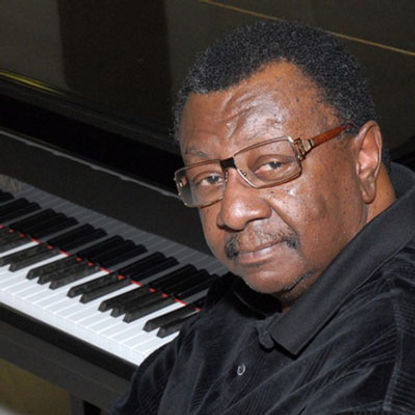
B i o g r a p h y
Charles Lloyd, Jr.
b. 1948
Charles Lloyd, Jr. is a musician of diverse gifts, and accomplishments as a composer, pianist, arranger, accompanist and vocal coach. Mr. Lloyd is presently Professor of Music and Director of Choirs at Southern University and A&M College, Baton Rouge, Louisiana. A native of Toledo, Ohio, he received a B.S. in Music Education from Norfolk State University and a M. M. in Piano Performance from the University of Michigan.
Mr. Lloyd is much in demand as a composer and arranger. In 2013 Mr. Lloyd was honored by The University of Texas with performances of his works by the Huston-Tillotson University Concert Choir, The University of Texas Concert Chorale and the Prairie View Texas A&M University Concert Choir. In 2011 his Cantata “Spirit Song” for Soprano, Baritone, Chorus and Piano was debuted for the 200th Anniversary of the 1811 Slave revolt in Louisiana. On August 2, 2008 his opera Emmett Till was debuted at Science High School in Newark, NJ. The Trilogy Opera Company commissioned the work. Mr. Lloyd was featured on the Hamilton Fairfield Symphony Orchestra American Masters Concert Series as one of America’s Premier exponents of African-American Spirituals. “Ballad of the Black Mother” and “Amazing Grace”, composed and arranged by Mr. Lloyd appear on Songs of America recorded by Oral Moses, bass-baritone on Albany records. Mr. Lloyd was also a collaborative composer for The Sisyphus Syndrome, a thematic concert in the operatic tradition to text by Amiri Baraka, and debuted at The Schomburg Center for Research in Black Culture. Kathleen Battle and Jessye Norman on Spirituals in Concert, a 1990 broadcast conducted by James Levine and recorded by Deutsche Grammophon, performed two of his works. His opera Song of Solomon was premiered in Detroit, Michigan, in 1988. His compositions and arrangements appear on Great Day in the Morning and Spirituals, recorded by Jessye Norman on Philips Records; The Passion of Christ in Spirituals recorded by Veronica Tyler, soprano; Let it Shine recorded by Laura-English Robinson, soprano; and the debut recording of Carolyn Sebron, mezzo soprano. Mr. Lloyd has composed more than sixty acappella choral arrangements of spirituals and hymns entitled The Invisible Church.
Mr. Lloyd’s works have been performed in recital, and by orchestra. He was commissioned to adapt spirituals by William L. Dawson for orchestra and chorus which were premiered by the Toledo Symphony Orchestra. In 2000, Warner Bros. Publications published a collection of Mr. Lloyd’s spirituals, entitled The Spiritual Art Song Collection. One of Mr. Lloyd’s compositions is included in The New Spiritual publication, and his art song “Compensation” appears in The Anthology of Art Songs by African American Composers both complied by Willis Patterson. He was commissioned to write two arts songs for Kevin Maynor, bass, with a text by South Africa’s Don Matera, which can be heard on his recording The Black Art Song. Mr. Lloyd has had several choral spirituals published, and his compositions and career has been highlighted in two doctoral dissertations: The Vocal Works of Charles Lloyd, Jr.: The Dramatic Works, Art Songs and Spiritual Art Song by Charis Kelly Hudson, Louisiana State University, December, 2011 and The Contributions of Twentieth Century African American Composers to the Solo Trumpet Repertoire: A Discussion and Analysis of Selected works by: Ulysses s. Kat, Adolphus C. Hailstork, Regina Harris Baiocchi, and Charles Lloyd, Jr. by Orrin Wilson, University of Nebraska, June 2011.
Mr. Lloyd has been the official accompanist for several international competitions including the International Voice Competition in Rio de Janeiro, the International Gaudeamus Competition of 20th Century Music in Rotterdam, the Munich Voice Competition, and the Sixth International Tchaikovsky Competition in Voice in Moscow, where he was honored with a distinguished accompanying award.
Mr. Lloyd is the recipient of the ASCAP Award, and the Arts Ambassadors’ Award by the Baton Rouge Arts Council. In addition, the Baton Rouge Arts Council funded “Revival II”, a program of vocal compositions.
